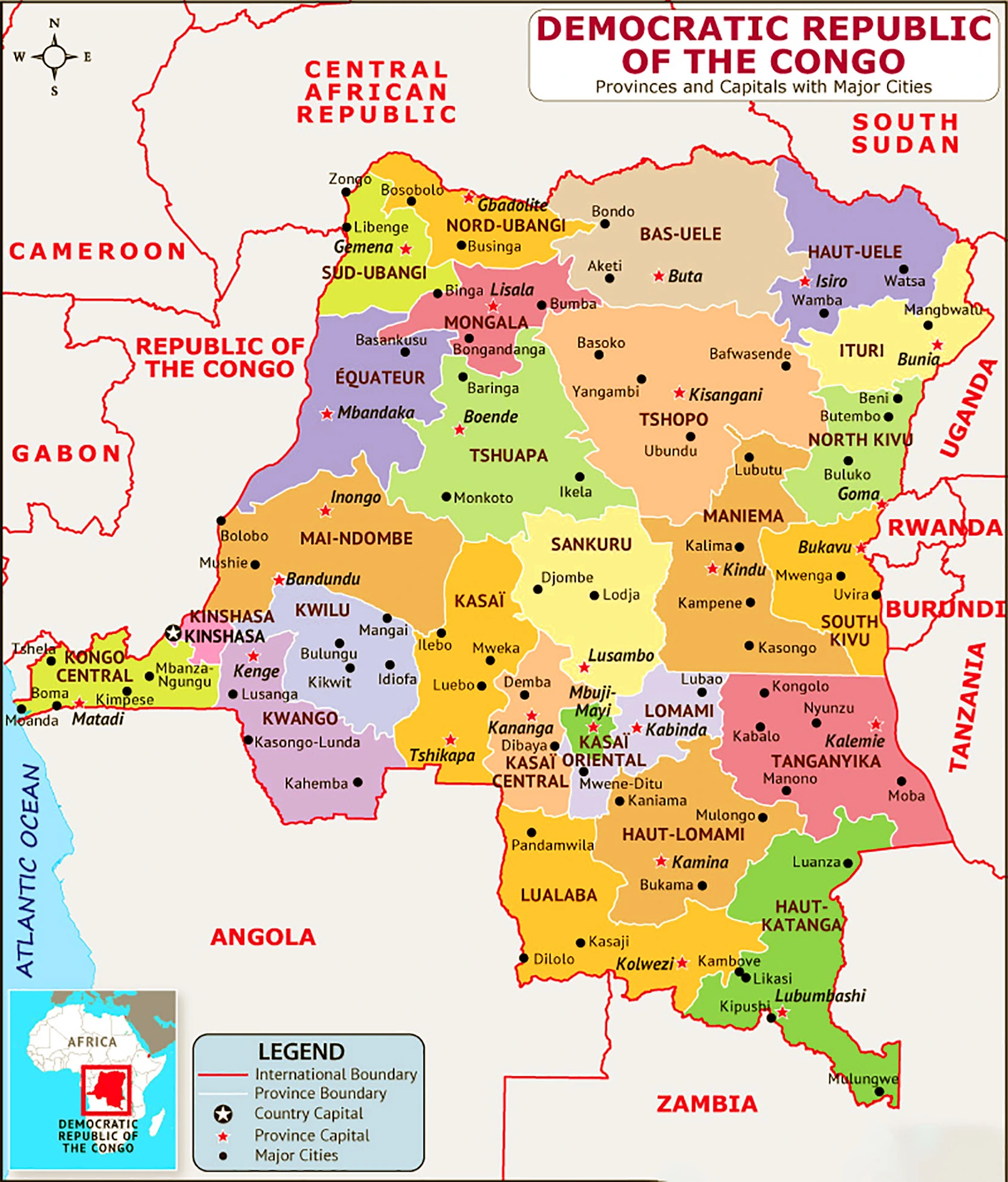Context:
- On October 30, the UN International Organization of Migration (IOM) reported that the number of people internally displaced in the Democratic Republic of Congo (DRC) has risen to 6.9 million.
Record High Displacement in the Democratic Republic of Congo
- In the eastern province of North Kivu, nearly a million people have been displaced due to the ongoing conflict with the rebel group, Mouvement du 23 Mars (M23).
- According to the World Food Programme (WFP), the crisis has left more than 1.1 million people in need of food support across North Kivu, Ituri, and South Kivu.

What is the conflict in the Democratic Republic of Congo?
- Origin of the Democratic Republic of Congo Conflict: The conflict in the DRC dates back to the 1990s when it went through two civil wars in 1996 and 1998.
- Rwanda Genocide: The conflict erupted in the wake of the Rwandan genocide in 1994 where ethnic Hutu extremists killed nearly one million minority ethnic Tutsis and non-extremist Hutus.
- Since then, the eastern DRC, bordering Rwanda, has been facing insurgency perpetrated by several rebel militant groups.
- Violence by several militant groups over territory and natural resources, extrajudicial killings by security forces, and rising tensions with neighbouring countries have killed thousands.
- Tensions between the Democratic Republic of Congo and neighbouring Rwanda continue to increase as both countries accuse each other of supporting ethnic Tutsi and Hutu-led rebel groups respectively.
| Who are the major actors?
M23:
- A Tutsi-led rebel group active in the eastern province of Eastern DRC.
- The group carries out frequent attacks and has taken control of several towns.
- Since January 2023, M23 has been advancing in the region after non-compliance with a ceasefire mediated between the DRC and Rwanda in November 2022.
Other Actors:
The Allied Democratic Forces (ADF):
- Allied Democratic Forces, the Uganda-based rebel group, has been operating since mid-1999 in eastern DRC and pledged their allegiance to the Islamic State in 2019.
Cooperative for Development of the Congo (CODECO):
- CODECO claims they aim to protect the interests of the ethnic Lendu against the Hemas and the Congo army.
East African Community (EAC): The East African Community (EAC) is a regional intergovernmental organisation of 6 Partner States. The Republic of Burundi, the Democratic Republic of the Congo, the Republic of Kenya, the Republic of Rwanda, the Republic of South Sudan, the Republic of Uganda, and the United Republic of Tanzania, with its headquarters in Arusha, Tanzania.
- In November 2022, the EAC deployed its troops in eastern DRC to stem the violence. The forces were from Kenya, South Sudan, Burundi and Uganda.
International Organisation of Migration: It was founded in 1951, and is dedicated to the idea that orderly and compassionate mobility is beneficial for both migrants and society as a whole. It is the foremost intergovernmental organization in the field of migration. As a related organization, IOM is a part of the UN system.
- India and IOM: India joined the IOM as a member state on June 18, 2008.
|
Reasons for displacement: The multiple rebel groups and several actors fighting in the region have carried out widespread killing, sexual violence, and massive human rights atrocities.
- Ethnic intolerance: Tensions intensified as Rwandan Tutsis organized militias against the Hutus who fled to the DRC. Subsequently, several ethnic and inter-ethnic groups who felt threatened started organizing their militias against each other.
- The political uncertainty President Felix Tsikedi came to power in 2019 through democratic elections. The country is to hold elections on December 20. However, the electoral commission has said that continuing insecurity in parts of the country would pose a challenge to a “free, democratic and transparent” vote.
- Lack of Inclusive Governance: The peripheries of the Democratic Republic of Congo are ruled by numerous ethnic chiefdoms that the government recognizes. The grievances of these peripheries are not met inclusively as struggles for representation, power, territory, and resources are being ignored.
- Lack of Funding: According to organisations such as WFP and the Norwegian Refugee Council, funding is a major challenge in assisting Congolese people facing hunger, starvation, and humanitarian crises.
- Regional Tensions: The armed groups have been supported by the governments of Rwanda, Uganda, and Burundi at various points, acting as proxies for each country’s interests in the region. All of these have led to the fourth factor which is a humanitarian crisis.
- Then there is Rwanda, which the DRC accuses of supporting the Tutsi-led M23 group. In contrast, Rwanda claims the DRC supports the Hutu militias who carried out the Rwandan genocide in 1994 and fled to eastern DRC. Both countries deny the other’s allegations.
- Feeble International Response: International actors have failed to make a considerable effort to address the crisis. However, since August, widespread protests have been ongoing demanding the withdrawal of the EAC and UN peacekeeping forces. Protesters accuse the regional and international forces of failing to address the insurgency.
Source: The Hindu
![]() 8 Nov 2023
8 Nov 2023
